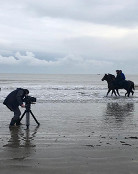Donn's Articles » IBA v HRI
IBA v HRI
Last Monday, armed with a report that they commissioned financial consultants KPMG to compile, the Irish Bookmakers’ Association launched its latest offensive against Horse Racing Ireland.
It was all pretty damning stuff. According to the report, during the period 1998 to 2008, HRI’s administration costs increased by €5.6 million, an increase of an incredible 660%. Marketing expenditure increased by €2.1 million during the same period, an increase of 112%, yet there was only an increase of 14% in racecourse attendances. Expenditure on integrity and racecourse services increased by €7.5 million, or 241%, HRI Racecourses Group’s operating costs increased by 216%, and HRI’s contribution to prize money increased by almost 600% even though the number of fixtures increased by only 33%.
In an eight-point summation of the KPMG report, the IBA highlighted the fact that HRI’s total expenditure had increased by 40% more than its total income between 1998 and 2008, and that HRI’s chief executive’s salary had increased by 56.6% between 2002 and 2008, while also pointing out that the all-weather facility at Dundalk remains closed during the winter months, although they probably didn’t need KPMG to tell them that.
HRI countered, as you expected they would, with the fact that HRI was not set up until late 2001, so any comparisons between 2008 and 1998 would have to have been with HRI’s predecessor, the Irish Horseracing Authority, which had a different structure. Chief executive Brian Kavanagh pointed out that HRI took over all the functions of the old IHA, as well as a lot of the Turf Club’s functions, and that this, on top of the addition of Fairyhouse and Tipperary to its racecourse division, increased HRI’s overall workload and responsibilities. Kavanagh also said that since 2008, HRI’s administrative expenses had decreased by 28%, and that the number of permanent staff employed by the HRI group had decreased from 176 to 143 (almost 19%).
There are a number of things that don’t sit squarely here. Firstly, why did the IBA feel the need to commission the report in the first place? It was a proactive step, an aggressive strike. It was the latest move in the spat that has developed between HRI and Irish bookmakers, which is regrettably being played out in public, during an era when racing should really be united and competing fiercely for its share of an ever-decreasing pie.
Secondly, how robust are the figures? The IBA had to have known that, in comparing IHA figures with HRI figures, they were, if not quite comparing oranges with apples, at very best comparing oranges with mandarin oranges. The 660% and 241% figures were good headline-makers, but they were not realistic. Figures like that rarely are in the normal course of events. And when unrealistic figures are presented as part of a report, it calls the veracity of the entire report into question. If you test positive once, your entire career comes under a cloud. A report on expenditure between 2002 and 2008 would have been far more legitimate and informative.
Thirdly, why were HRI not asked to contribute to the report before it was completed, and why were they not allowed see it before the findings were published? The IBA asserted that it was confidential, that they weren’t allowed hand out the report, and that they were only allowed refer to excerpts. Who determined that it was confidential? And how is it confidential if you present the findings?
At a micro level, it would certainly be helpful if HRI could produce a breakdown of some of the figures and justify the value that they are getting for their €2.1 million marketing spend or their €7.5 million spend on integrity services, but surely any increase in prize money is a positive. There is an argument for a more even distribution of prize money, for a reduction at the top level in order to facilitate further funding at the lower levels, but prize money matters at the top level as well (why does the Prix de l’Arc de Triomphe invariably attract the best middle-distance horses in Europe and some from further afield?) and HRI claim anyway that their contribution to the total prize money for the five Irish Classics, a total of €2.5 million, was a mere €20,000.
The bottom line, however, at a macro level, is that all of this is nit-picking, it is arguing over who sits port and who sits starboard on The Titanic, and it is incidental to the elephant in the room: the decline in tax contribution from betting to the exchequer and the danger into which the future funding of Irish racing has consequently been pitched.
Further to An Taoiseach’s assurances last May, we are still awaiting the unveiling of a workable potential solution to the problem that has seen tax take from betting fall from €68 million in 2001 to €31 million in 2009, despite the fact that the total amount bet per annum in that time has increased from an estimated €1.3 billion to an estimated €4.5 billion. There is talk of a 1% tax on on-line betting, which may or may not be incorporated into next month’s budget. That is a plausible solution as long as it is workable and policeable, probably through the issuing of licences, and, crucially, as long as the betting firms that are domiciled in Ireland are not placed at a disadvantage relative to those based overseas.
The primary objective for all should be to ensure that the funding for Irish racing is secured going forward. Then we can all squabble over how we should spend it.
© The Racing Post, 16th November 2010


 Follow Donn
Follow Donn